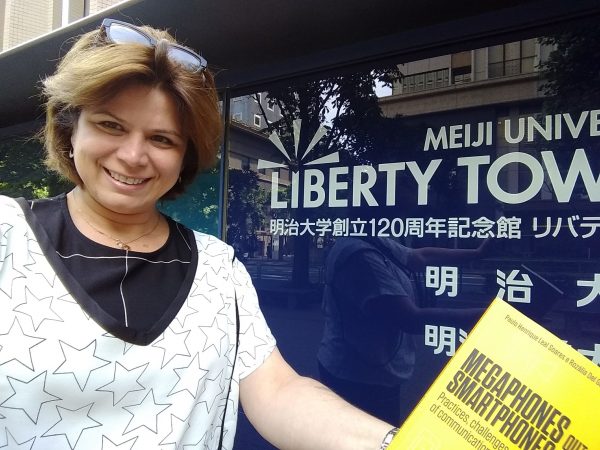Aberje Editorial launches book in Spanish


The book Megaphones Out, Smartphones In: Practices, challenges, and dilemmas of communication with employees, written by Paulo Henrique Soares and Rozália Del Gáudio and released in 2017 by Aberje Editorial, has gained a Spanish language version. The book addressed the dilemmas of communication with employees and was published in English two years ago. So far, the authors have toured more than 70,000 km, including international launches in Italy, Spain, Japan, Canada, and England.

The work proposes a new look at the communication and relationship processes that take place in the internal context of organizations, analyzes the changes in society, and relates them to the communicative strategies of organizations. It brings a management model built from the practical experience of more than 20 years of the authors. According to Soares, the Spanish version was a demand from the market. “Some of the professionals who gave us testimonials told us that there was a demand for content for communication with employees in their countries,” he said.
The authors state that feedbacks have been very positive since the book was first released in Portuguese three years ago. “We continue to receive invitations to talk about the work at events. Our main objective has been achieved – to expand the debate on communication with employees, demonstrating its importance and relevance for organizations”.

Out of Brazil, the book was launched in Tokyo (Japan), Trieste (Italy), Toronto (Canada), Madrid (Spain), and London (England). Paulo says that the authors took advantage of their business trips or academic commitments to launch the book and share the content with a global audience. “This reveals the importance of translating the book into English, and now into Spanish. If the Brazilian business communication industry wants to break the borders of our country, we need to focus on producing content in other languages. That’s what we realized,” says Soares. The book brings testimonials from more than 80 professionals from 35 countries.
The receptivity was also positive in the academic environment – the authors participated in two international congresses not linked to business communication. In an event organized at the University of Trieste, there was a great reflection on the role of communication so that, in fact, people experience corporate values in practice. On its side, the congress at the University of Meiji discussed imperfection, incompleteness, and impermanence in organizational life. “In Japan, our presentation focused on the importance of clear and effective communication that allows employees and leaders to connect and have less asymmetric relationships,” said Del Gaudio

New research after the pandemic
Everything is continually changing and evolving. With the Covid-19 pandemic, technology is even more present in the management of companies, coupled with the need for work at home. In other words, all of this was already possible, but it became a necessity.
“These changes were profound in the relationship between the company and the employee. A new chapter will need to be produced, a lot of research carried out so that we can understand what has changed. The workspace has invaded the personal world. It is a considerable change. It would be inconceivable before the pandemic that someone was attending a meeting, and a child suddenly appeared on camera or was heard shouting in the background. Now, this is our ‘new normal’; it is even ‘more humanized.’ Taking the world of work home is not as simple as it seems,” said Soares.
According to the authors, the pandemic also changed the position of the managers of the organizations. “Managers who were used to doing their job in person have to develop skills to do the job virtually. It may seem simple, but it is not”, they said.
“Despite all these changes, it is interesting to note that the model we have proposed for the management of communication with employees remains valid. The support for leadership communication has proven to be even more important since, in addition to speaking, we also need to take care of how that speech takes place; vehicles and internal campaigns had to adjust to the context and expectations of people, who were more eager to consume corporate content; and the events that have migrated to the online environment without losing sight of its crucial importance of bringing people together and creating spaces for sharing”, said Del Gaudio.
You can order your version of Megaphones Out, Smartphones In: Practices, challenges, and dilemmas of communication with employees via email, by contacting lidiane@aberje.com.br.
COMENTÁRIOS:
Destaques
- SHEIN associa-se à Aberje
- Aberje recebe BHP como nova associada
- Em entrevista a CNN, CEO do Pacto Global da ONU no Brasil fala sobre comunicação e sustentabilidade
- EMIS é nova associada da Aberje
- Lab de Comunicação para a Sustentabilidade discute oportunidades e desafios para ações sociais
ARTIGOS E COLUNAS
Paulo Nassar Fala na abertura do Seminário Opinião Pública, Política e DemocraciaRegina Macedo Narrativas femininas: amplitude e diversidade na comunicaçãoPatricia Santana de Oliveira Qual retorno do investimento em PR?Marcos Santos Esporte como Plataforma de MarcaCarlos Parente Na vida e no mundo corporativo, não há texto sem contexto


























